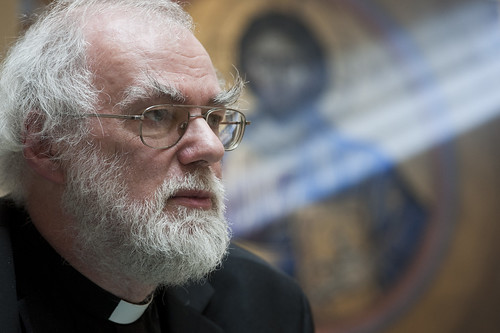14th March 2012
The Archbishop of Canterbury in Rome

It is often easier to say what divides religion than what unites. And that is certainly the emphasis given by media reporting from the “front line”, be it sectarian violence in Nigeria or historic resentments in Northern Ireland. Sometimes, regrettably, religious division is real, and does lead to violence. But very often it is the pretext rather than the cause. And religious disunity is not the whole story.
These reflections came to me during the Archbishop of Canterbury’s recent visit to Rome to celebrate the Millennium of the Camaldoli branch of the Benedictine tradition. During his visit Dr Williams met Pope Benedict, celebrated Vespers with the Pope at the Monastery of St Gregory the Great, prayed with the St Egidio community in Trastevere, celebrated Eucharist at the US Episcopalian Church of St Paul’s Inside the Walls, and visited the abbey of Montecassino, linked historically with Anglicanism through the Benedictine relationship.
In one address, Dr Williams recalled the Archbishop recalled Pope John Paul II’s and Archbishop Robert Runcie’s characterisation of the communion between Canterbury and Rome as “certain yet imperfect”. As with all relationships, imperfection clearly has its place. But the overarching message throughout the visit was one of the importance of unity. Despite the vicissitudes, historical failures and, yes, even religious wars, this is a relationship that has survived 1,500 years since the first monks sent by St Gregory under St Augustine arrived on the shores of Kent. And what characterises it now, as was evident during the visit, is respect, tolerance, mutual regard and, indeed, friendship.
I have a particular task. At the St Egidio Community, they showed me an altar on which were laid copies of the Bible published in “most” of the languages of the world. ‘Welsh, or Scots-Gaelic?’, I enquired. Blank looks. One of the unifying aspects of religion is its crossing of political boundaries, reaching out to other nations and languages. If anyone has a Welsh or Scots-Gaelic edition of the Bible, I’d be delighted to present it to St Egidio to add to their collection!
Reference was made to Nigeria with regards to sectarianism. Religion is a political tool in Nigeria., the unending quest for superiority between North and South finds expression in bloody conflicts, the most effective incendiary being religion.
It is highly doubtful if Nigeria can solve its religious problems without solving its political problems first.
I am very happy that tolerance, respect, mutual regard and friendship
are the main values that still exist in 2012. Let it be like this forever!
Unfortunately, I only have a French Catholic Bible. If I can find the
edition that you want, I will write to you.
Sincerly,
Francine Deschenes ( College teacher, Montreal Canada )